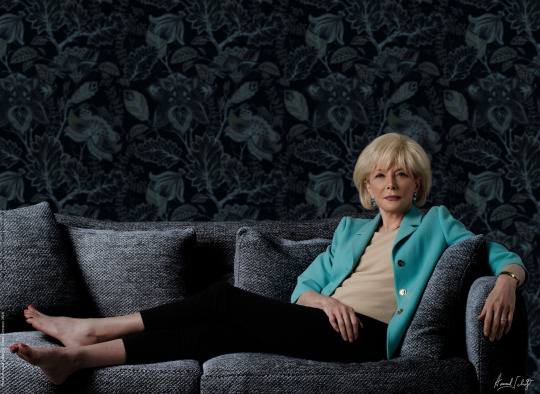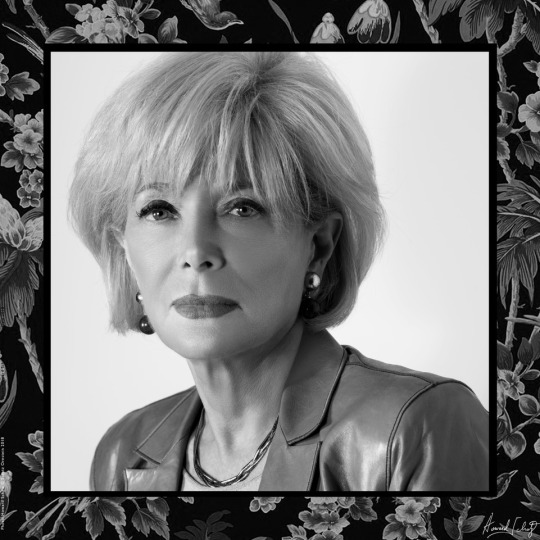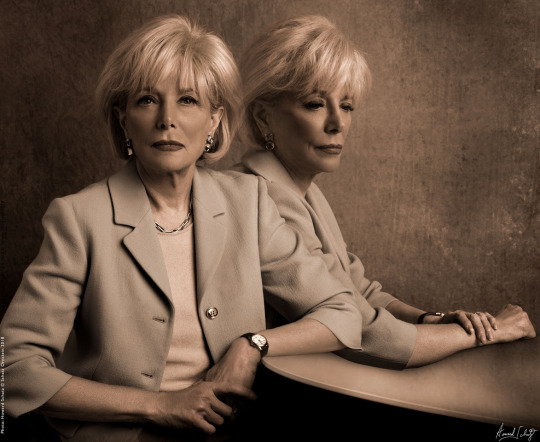
Lesley
Stahl, the American television journalist, now 76, has spent most of
her career with CBS News having been affiliated with that network
beginning in 1972. Since 1991, she has reported for the venerable CBS
news magazine 60 Minutes.
She was the CBS White House correspondent during the presidencies of
Jimmy Carter, Ronald Reagan and George H. W. Bush. From 1983 until 1991
she was the moderator of Face the Nation, and hosted 48 Hours
Investigates from 2002 to 2004.
Among her many journalistic awards are the Edward R. Murrow Award for
Overall Excellence in Television, and the Alfred I. DuPont-Columbia
University Journalism Award. Additionally, she’s won several Emmy Awards
for her work on Face the Nation and 60 Minutes.

As is my usual approach during portrait sessions for the project Above and Beyond, I conducted an interview. Excerpts are below:
HS: Whether from inner passions, external forces, unexpected circumstances… how did you get to be Lesley Stahl?
LS: I had not been interested in journalism. After I
came to New York, I was working for Mayor [John] Lindsay, and I happened
to wander into his press room. I said to a fellow sitting there, “What
do you do all day?“ He was a newspaper reporter and he told me in detail
what he did. He made phone calls, he was nosy, he sopped up serious
information as well as gossip.
And I grew more and more and more excited at what he did all day. I
said, “Why hasn’t anybody ever told me about this?” It was a
thunderbolt, it was instant, it was huge. And I said, I have to do that.
I left my job with the mayor and found a job at NBC News. I worked on
the 1968 presidential election. From the minute I started, until
today when I’m sitting here talking to you, I’ve never lost that love I
have for what I do. I’m not kidding.
HS: Was it a natural curiosity or something else?
LS: It was everything. It was the challenge of getting
information. It was like a hunt. It was like being a warrior. I have to
get this information, I’m on the trail, I’m finding it. I’m going to
conquer it. I like condensing everything into a story.
HS: You have a journalistic instinct that I think might
conflict with your human sensitivity. Do you ever ask a question that
you’re sorry you asked?
LS: At 60 Minutes our stories very often require tough
questions. Mike Wallace, who may have been the greatest interviewer
ever, called me into his office. He said, “Hey kid, you’re never going
to make it until you learn to ask an embarrassing question without being
embarrassed. I can do it. You have to learn how to do it.”
HS: Have you?
LS: Yes, I think so. It still hurts. I’ll tell you, it
hurts to ask a mother about a child who has died. They’re there to
discuss it. But it hurts to force them to go there. It hurts. It’s very
hard.
There are different sorts of stories and people interviewed. One is the
human being who deserves compassion and is submitting themselves to 60
Minutes over a difficult, painful situation. Then there’s the crook, and
you can ask him anything. And then there’s the politician and you can
ask him or her anything. Anything.
I don’t get embarrassed, but I will tell you that several people have
walked out on me. Just thrown the microphone on the floor and stomped
off. I had then president of Russia, Yeltsin, he stormed out. Sarkozy,
when he was president of France, threw the microphone on the floor, said
something vulgar in French and stormed out. I was asking the obvious
questions–to me. And they didn’t like it and they were insulted, or in
their country journalists don’t ask personal questions.
Sarkozy stormed out because I asked if his wife had left him. And you
know, who wouldn’t ask that question? It was the biggest story in the
country. But I guess reporters in France don’t ask things like that.

HS: And your interviews with our current president?
LS: He auditioned me. I had to go sit and be auditioned
in his office. He wanted very much to be on 60 Minutes, because we are
the place for anybody who wants to reach a large, sophisticated
audience. And, we are a broadcast that covers everything with dignity.
We’re not there really to shame people, that’s not the point. Trump
wanted to be on 60 Minutes and gave it to me. He summoned me and my boss
to his office before he agreed. And we spent an hour with him in his
office. It went well. And I got the interview. I got two interviews.
He was charming. This is a side of him that a lot of people don’t see
when they watch him giving his big speeches. He’s funny. I think he’s
very funny. He asked us a lot of questions. It wasn’t a monologue at
all. He was him though. He told me and my boss that this was the best
office in the world, and he had the best view in the world.
We got the interview. And at the end of that interview he said, you’re
going to get my first interview as president, he promised it. And then
he fulfilled the promise.
HS: How careful did you have to be? You’re at a place where he’s given you a gift. And has the potential to give you future gifts.
LS: Well, this was his first interview as president, or
president elect. It was just two or three days after he won the
election, which was a huge surprise. To everybody. And I mean everybody,
including him.
He won’t admit it, but I saw a man in a state of shock that day. I
covered the White House for ten years. I covered three presidents. And
my position in my mind throughout was that you respect the presidency.
Respect the president because it is the presidency. And I was determined
to treat him with a great deal of respect. I asked him a lot of serious
questions, focusing on issues. We had discussed that before the
interview – my boss, and I, and my team of two producers. We talked
about tone and the kind of questions and decided we would do issues.
What happens with me in an interview is that I go in with questions. We
kind of game it sometimes: If he says this, what’s our follow-up; if he
says that, what’s the follow-up?
I work on these questions, they become mine. Even though I’m helped, we
sit in a circle, and everybody throws questions. But they become mine, I
know them. And then I listen. And if someone wants to go somewhere I’ll
follow them. And I am totally there, as I am with you right now. I’m
nowhere else.
HS: Do you ever cut anybody off because it is absolutely not going anywhere?
LS: A lot. A lot. I did Face the Nation which is live.
The clock ticks. If you have a bunch of questions that are really
important, you’ll cut in…you have to.
That isn’t what we do at 60 Minutes. If someone wants to talk for a while, we let them. If it’s really a filibuster, we’ll stop.
HS: How have you built and maintained such an impressive career along with being a mother and wife?
LS: There are two things in my life that allowed me to
have my career without much guilt… a little guilt, but not a lot. The
first was my mother who wanted me to have a career. I remember her
saying before I went to college. “Not a job. I want you to have a
career.” She was on my case about having a career and not having
children. Because you can’t have a career and children. And the career
comes first, you have to have a career. She was a backstage mother with a
big foot in my back, pushing me, constantly. And then I had my career. I
was a reporter.
She said, “Don’t have children, don’t have children.”
Then I turned 35 and she went, “I was wrong. You have to have a child.”
She said, “Don’t worry about taking care of the child and having your
career. You must have your career. No matter what. If… I’ll live with
you if you want, I’ll be your nanny.”
I got pregnant.
And my husband, as a writer, worked at home. So I had a great nanny,
thanks to my mother. And I had Aaron, my husband, who had an office in
our apartment. And so my daughter had people loving her at home.
HS: One last thing: There’s always been fake news.
People have always made things up throughout time. But now it’s so
prevalent and permeates everything. I wonder what you think about it?
LS: I’m worried. I’m pessimistic about the future.
Partly because of this insinuation about fake news, that as you say,
absolutely permeates. How does 60 Minutes get caught up in what Fox News
is saying? But we do. It’s the reputation that they have given news,
and it seeps all the way through the system. And then the president
starts attacking mainstream media. So, now we are all tainted. You see
it in polls. People don’t trust the media anymore. You know, we are
essential to democracy, we are essential to this form of government that
we have.

But if you have a press that’s weak we can’t ferret out corruption. It’s
corrosive. Now what we have to do is just do our jobs. And we’re doing
them the way they should be done, with our standards. The truth is the
most important thing. As someone said, life is an act of courage, and
we’re just plowing through this. But I am very dark about our survival.